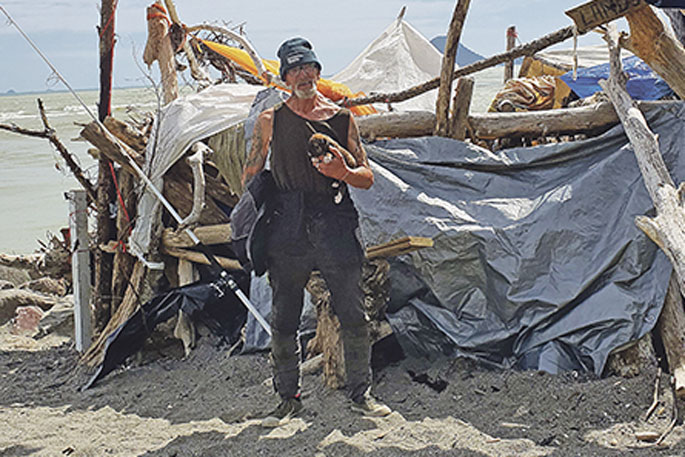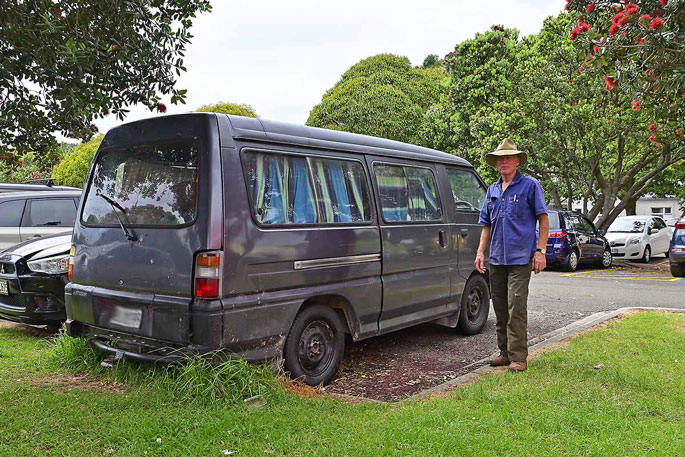It as been almost five years since the Whakatāne Homeless Action Group was formed in response to growing numbers of rough sleepers.
The group had some success at the time through its Breakfast Club in Canning Place but went into recess when New Zealand went into Covid-19 lockdown in 2020 and has not been restored.
Whakatāne Mayor Judy Turner believes the number of homeless has crept up again recently and Whakatāne District Council has recently been looking into more permanent ways to help those in our community whose needs often extend much further than a meal and a roof over their heads.
Three members of an organisation that successfully tackles homelessness in Hamilton and Tauranga were invited to give a presentation to the council recently.
The People's Project began in Hamilton in 2014, funded by not-for-profit community organisation The Wise Group and provides a housing-first response to homelessness.
Wise Group chief executive Julie Nelson said in 2014 they knew of 80 people sleeping rough in Hamilton's city centre. It housed those 80 people and hundreds more since. The group has proved the housing-first model – putting people into homes without first requiring them to meet certain criteria such as to stop drinking or taking illegal substances – improved outcomes for people.
'It's just about housing people and then dealing with some of those drivers that lend people to some of those other behaviours.”
She said that while some people were transitionally homeless and just needed steering towards the right agencies for help, The People's Project worked with some of the most difficult cases that other agencies refused to work. The chronically homeless. Often they had been trespassed from the very places from which they required help.
'We never give up,” Ms Nelson told the council. 'We've housed some people 17 times, and that's part of what housing first does. It's not judgmental and it keeps working for people.”
 One of Whakatane's most high profile homeless was Crazzy Horse, who built himself a hut at The Heads last year before eventually moving on. File photo.
One of Whakatane's most high profile homeless was Crazzy Horse, who built himself a hut at The Heads last year before eventually moving on. File photo.
She said as well as helping the people living rough, it improved the safety of the city.
'When we first started in 2014, security guards were walking people from their offices, in broad daylight, to their cars.”
She said The People's Project's success had been largely due to having the most senior people from key organisations at the table.
'If you're going to disrupt the system and create some change, you've got to have people at the most senior levels who are comfortable around some of that disruption, because potentially what you're saying is, ‘some of the activity that your agency does needs to change because you're part of the problem'.”
The People's Project has been part of a Government-funded study carried out by University of Otago that looks at some of the social issues facing the long-term chronically-homeless.
Dr Carol McMinn presented findings that showed enormous levels of debt, long histories of poor health and childhood abuse, high levels of disruption throughout their lives, disconnection from family and hundreds of interactions with the health and justice systems where social policies could have made all the difference.
Of those Ms McMinn surveyed, she said 94 out of 98 people had survived a high level of abuse and trauma in childhood.
'Homelessness is not just about a lack of housing. The lack of housing is the very last part of their journey,” Ms McMinn said.
'We need to understand that the majority of people who have come through as single adult homeless have possibly, and probably, had a high trauma background. On top of that, over half had gone on to be wards of the state. Most people [experienced] being bullied and truant at school and leaving school at 15. In those early ages there had been a disruption and decline in their health - anxiety, suicidality, substance abuse at an early age. If someone finds themselves [chronically] homeless, it's probably been a very long journey to that point.”
Council's role in homelessness
AS local councils are affected by the host of reforms coming from central Government, Whakatāne Mayor Judy Turner says the Whakatāne District Council needs to look ahead to what its responsibilities may be in the future.
In the Future of Local Government review, housing, poverty, and inequality are all high on the agenda of discussions about local government's role in community wellbeing.
'The big problem going forward is, do we, as a council, need to have a policy to take some responsibility. If you look at the reforms of local government that we're heading toward, although there is still a lot of detail that we are unclear about, I suspect that some of these things will become mandated as roles that councils will start to play,” Mrs Turner said. 'In the meantime, we do it because we care.”
What local government didn't currently have access to, in regard to homelessness, was funding.
'It has always been the responsibility of central government agencies,” Mrs Turner said.
'What we're finding now around Whakatāne is the needs have changed slightly. There's lots of people with complex needs where housing isn't the only issue - and sometimes they like living homeless. How do you do the best that you can for people in those circumstances? Yes, I think our numbers are back up again. I'm not sure they're back as high as they were back [in 2017]. I think things have definitely improved, but we just have this huge housing shortage.
'What I liked about the presentation [by The People's Project] is that it's got a longer-term focus. The housing-first project was a very interesting one. I think there's a huge amount of merit there.
I think our next step is to ask, do we need a local application of that, or are the existing agencies able to do it?”
Mrs Turner said when she started the Whakatāne Homeless Action Group five years ago, 53 people, including children had been identified as living rough or sleeping in cars in or close to the Whakatāne CBD.
After a well-attended public meeting in 2017, the action group was formed, and the Breakfast Club started serving free breakfasts. Staffed by volunteers and paid for with donations from church groups and other charities, it helped build relationships between the homeless people and the agencies that could help them.
'We put on breakfast every [weekday] morning. It was nothing cleverer than that,” Mrs Turner said. 'We built a relationship, so we could then go with them down to the agencies, sort of that navigator kind of role. Also, it meant that the agencies could come themselves to one of the breakfasts during the week and just get to know people and offer some help. I think it was very successful.”
Mrs Turner said she received many complaints about the homeless, from people who don't want them 'in their backyard”.
'They want me to move them on or kick them out of town. Actually, I don't have that power. But the point is, in my mind, they're somebody's brother, they're somebody's father, they're somebody's uncle, they're somebody's cousin. These are people who, for whatever reason, have reached this state. So where can we locate them?”
An example of a recent council intervention were two people sleeping rough in a vehicle behind The Strand earlier this year.
'I went round a few agencies to see if anybody was working with these people. I didn't strike any gold so I took it to our own community development staff and just said, ‘I know you've got a lot to do but is there anything you could do that might help this situation'. They found and housed these two people, and the vehicle, and did an amazing job. I was very proud of how they had resolved that situation. To do the wider job would take a lot more resourcing than we have right now. But should we set that up? That's a really interesting discussion going forward.
'That's why, though I think we're nervous about the reforms, we need to be open to the fact that there are some needs in our community that are not as thoroughly met as they could be and maybe the council would be the best organisation to do that if we could secure funding."



1 comment
Of course
Posted on 12-05-2022 12:39 | By Kancho
Yep as inflation runs rampant the money to cover living dries up and rent is one of the first after food and petrol etc. Sadly it's going to get worse.
Leave a Comment
You must be logged in to make a comment.